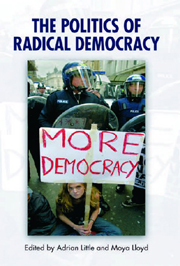Book contents
- Frontmatter
- Contents
- Acknowledgements
- Notes on the Contributors
- Introduction
- 1 Rhetoric and Radical Democratic Political Theory
- 2 Performing Radical Democracy
- 3 Aboriginal Sovereignty and the Democratic Paradox
- 4 Judith Butler, Radical Democracy and Micro-politics
- 5 Post-structuralism, Civil Society and Radical Democracy
- 6 Hegemony and Globalist Strategy
- 7 Is ‘Another World’ Possible? Laclau, Mouffe and Social Movements
- 8 Friends and Enemies, Slaves and Masters: Fanaticism, Wendell Phillips and the Limits of Agonism
- 9 The Northern Ireland Paradox
- Conclusion
- Bibliography
- Index
5 - Post-structuralism, Civil Society and Radical Democracy
Published online by Cambridge University Press: 12 September 2012
- Frontmatter
- Contents
- Acknowledgements
- Notes on the Contributors
- Introduction
- 1 Rhetoric and Radical Democratic Political Theory
- 2 Performing Radical Democracy
- 3 Aboriginal Sovereignty and the Democratic Paradox
- 4 Judith Butler, Radical Democracy and Micro-politics
- 5 Post-structuralism, Civil Society and Radical Democracy
- 6 Hegemony and Globalist Strategy
- 7 Is ‘Another World’ Possible? Laclau, Mouffe and Social Movements
- 8 Friends and Enemies, Slaves and Masters: Fanaticism, Wendell Phillips and the Limits of Agonism
- 9 The Northern Ireland Paradox
- Conclusion
- Bibliography
- Index
Summary
What is the space of a radical democratic politics? Does ‘civil society' constitute the domain most appropriate to radical democrats’ concerns? In this chapter, I consider the value of the notion of civil society for conceptualising radical democracy from a post-structuralist perspective. Whilst in recent years a number of political theorists have seized upon civil society as a realm of relative freedom, pluralism and self-organisation ideally suited to reviving and deepening democratic politics, this chapter sounds a more sceptical note. Against the idealisation of civil society as an almost ready-made ‘public sphere’ in which citizens deliberate independently of power relations, I draw upon Ernesto Laclau's notion of ‘dislocation’ to underline the intrinsic contingency, unevenness and power-infused character of civil relations. Post-structuralism's concerns, I continue, are primarily with the limits of social identity and the impossibility of fully constituting ‘society’ as a stable order. Whilst contemporary ideas of and practices in civil society certainly capture some of this contingency, nevertheless it remains a complex and ‘undecidable’ domain, the site of efforts to hegemonise the field of dislocated identities.
A post-structuralist-inspired, radical democratic perspective on civil society, I argue, needs to take into account the linkage between social identities and the experience of dislocation. This is not simply to note the empirical particularity of civic associations and the limited nature of their demands, out of which forging some collective purpose might be practically difficult.
- Type
- Chapter
- Information
- The Politics of Radical Democracy , pp. 92 - 111Publisher: Edinburgh University PressPrint publication year: 2008



